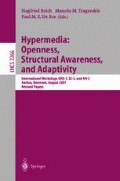Abstract
We describe a methodology and an authoring/publishing tool for adaptable and/or adaptive Web documents. Our approach is based on intensional logic, the logic of assertions and expressions, which vary over a collection of contexts or possible worlds. In our approach the contexts are sets of values for parameters which specify the current user profile as supplied by the current Web page URL, and the latest user input. The author produces generic (multi-version) source in the form of HTML with extra markup delimiting parts that are sensitive (in various ways) to the parameters. This source (in what we call Intensional Markup Language) is translated into program in a Perl-like language called ISE (Intensional Sequential Evaluator). To generate the appropriately adapted individual pages, the server runs the ISE program in the appropriate context. The program produces HTML that, when displayed in the user’s browser, is rendered into the desired adaptation of the requested page. Although this intensional approach was originally designed to work without any explicit user model, we can extend it (and make the documents adaptive as well as adaptable) simply by incorporating a user model that monitors the user and computes some of the profile parameters.
Access this chapter
Tax calculation will be finalised at checkout
Purchases are for personal use only
Preview
Unable to display preview. Download preview PDF.
References
Brusilovsky, Peter: Methods and techniques of Adaptive Hypermedia. Adaptive Hypertext and Hypermedia. Kluwer Academic Publishers, Amsterdam (1998) 1–43.
De Bra, Paul, Calvi, Licia: Towards a Generic Adaptive Hypermedia System. Proceedings of the 2nd Workshop on Adaptive Hypertext and Hypermedia HYPERTEXT’ 98, Pittsburgh, USA, June 20–24, (1998) 5–12.
Bra, Paul: Design Issues in Adaptive Hypermedia Application Development. 2nd Workshop on Adaptive Systems and User Modeling on the WWW. Toronto (1999) 29–39.
Kushmerick, Nicholas McKee, James and Toolan, Fergus: Towards Zero-Input Personalization: Referrer-Based Page Prediction. In: Brusilovsky, P., Stock, O., Strapparava, C. (eds.): Adaptive Hypermedia and Adaptive Web-Based Systems International Conference, AH 2000, Trento, Italy, August (2000). Proceedings. Springer-Verlag, Lecture Notes in Computer Science, Vol. 1892, 133–143.
Petrelli, Daniela, Baggio, Daniele and Pezzulo Giovanni: Adaptive Hypertext Design Environments: Putting Principles into Practice. In: Brusilovsky, P., Stock, O., Strapparava, C. (eds.): Adaptive Hypermedia and Adaptive Web-Based Systems International Conference, AH 2000, Trento, Italy, August (2000). Proceedings. Springer-Verlag, Lecture Notes in Computer Science, Vol. 1892, 202–213.
Plaice, J. and Wadge, W. W.: A New Approach to Version Control, IEEE Transactions on Software Engineering, March (1993) 268–276.
Schraefel, M.C. “ConTexts: Adaptable Hypermedia.” In: Brusilovsky, P., Stock, O., Strapparava, C. (eds.): Adaptive Hypermedia and Adaptive Web-Based Systems International Conference, AH 2000, Trento, Italy, August (2000) Proceedings. Springer-Verlag, Lecture Notes in Computer Science, Vol. 1892, 369–375.
Swoboda, P. Practical Languages for Intensional Programming, MSc Thesis (Computer Science), University of Victoria, Canada (1999)
Wadge, W. Intensional Logic in Context. Intensional Programming II, World Scientific Publishing, Singapore (2000) 1–13.
Wadge W., Brown, G., Schraefel, M. C., Yildirim T.: Intensional HTML, Proc 4th Int. Workshop PODDP '98, Springer Verlag LNCS 1481 (1998) 128–139.
Wadge, W. Intensional Markup Language. Peter Kropf, Gilbert Babin, John Plaice, Herwig Unger (eds.): Distributed Communities on the Web, Third International Workshop, DCW 2000, Quebec City, Canada, June 19–21 (2000). Proceedings. Lecture Notes in Computer Science, Vol. 1830, Springer (2000) 82–89.
Yildirim, Taner. Intensional HTML Masters Thesis, U of Victoria, Canada. (1997)
Author information
Authors and Affiliations
Editor information
Editors and Affiliations
Rights and permissions
Copyright information
© 2002 Springer-Verlag Berlin Heidelberg
About this paper
Cite this paper
Wadge, W.W., Schraefel, M.M.C. (2002). A Complementary Approach for Adaptive and Adaptable Hypermedia: Intensional Hypertext. In: Reich, S., Tzagarakis, M.M., De Bra, P.M.E. (eds) Hypermedia: Openness, Structural Awareness, and Adaptivity. AH 2001. Lecture Notes in Computer Science, vol 2266. Springer, Berlin, Heidelberg. https://doi.org/10.1007/3-540-45844-1_31
Download citation
DOI: https://doi.org/10.1007/3-540-45844-1_31
Published:
Publisher Name: Springer, Berlin, Heidelberg
Print ISBN: 978-3-540-43293-7
Online ISBN: 978-3-540-45844-9
eBook Packages: Springer Book Archive

